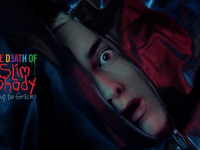
With grand, big band sound – Manic Street Preachers have returned after a four year wait with Resistance is Futile. But was it worth it? Read on to find out…
Opening Resistance is Futile with “People Give In”, James Dean Bradfield’s distinctive vocals go from dramatic shouts to spoken word poetic moments over a backdrop of overdriven guitars with twinkling arpeggios and violins and cellos. Four years is the longest we’ve had to wait for a full release from the longstanding Valleys rockers but is this particular delay a moment of ‘had to’ or ‘wanted to’?
‘Wanted to’ is a possibility. Due to the lukewarm reception of their last two albums, the band may have wanted to spend a bit more time getting back to basics. The band also had ripples of wanting to quit altogether – still very much a possibility. ‘Had to’? Maybe. Anniversary tours dragged on longer than expected. The band’s Cardiff Faster studio was also demolished, meaning a new headquarters in Newport was needed – a clear reason for delay. It’s likely a bit of both.
“International Blue” is instantly recognisable as the type of chart topper we’re used to hearing from the band – punchy, catchy and accessible. Taking influences from the legendary second album, Gold Against The Soul, the track is instantly recognisable with its grungy chords and powerful vocals as a surefire hit.
 The band have stated that Resistance Is Futile is designed to be an antidote to the vastly negative socio-political state of the world at the moment – which it manages, albeit in a bittersweet way. By utilising Bradfield’s undeniable song writing talent (as ever reinforced with contributions from his bandmates, credited as lyricists on most tracks as well), the trio have managed to weave positive and defiant messages of hope into their work. Never without a touch of darkness to their music, as anyone who’s heard The Holy Bible will know, this album is packed with throwbacks to their past style as well as songs in the vein of their influences.
The band have stated that Resistance Is Futile is designed to be an antidote to the vastly negative socio-political state of the world at the moment – which it manages, albeit in a bittersweet way. By utilising Bradfield’s undeniable song writing talent (as ever reinforced with contributions from his bandmates, credited as lyricists on most tracks as well), the trio have managed to weave positive and defiant messages of hope into their work. Never without a touch of darkness to their music, as anyone who’s heard The Holy Bible will know, this album is packed with throwbacks to their past style as well as songs in the vein of their influences.
One surprising influence the band have stated came early in their formation was that of Black Sabbath. Not that the band would ever be “metal”, but on this album alone, look no further than “Broken Algorithms”. With a faster tempo and rattling drum fills than you’d usually find the band utilising, coupled with a relentless guitar line, it’s easy to hear where that distinct, British heavy metal sound takes a light grip on the Manic’s wheel.
“Distant Colours” and “A Song For Sadness” give a clear shout out to the influence that Bowie has had (let’s be honest, has anyone who’s come since not cited him?) on the trio. Being vocally led, as the man himself was, the band uses more complex structures with clever additions of keyboards and soundscapes created by the talented drummer/engineer of the three-piece (Sean Moore) to create unique and captivating tracks. The nods to their influences don’t stop here however – there’s most definitely a number Bruce Springsteen would be proud of on this album. Utilising the vocal talents of The Anchoress (real name Catherine Anne Davies), a Welsh-born multi-instrumentalist paired with the talents of Bradfield et al, they’ve created a romantic folk-rock ballad that The Boss could have penned himself.
Not satisfied with a singular track around the theme of love, the band turn out “Hold Me Like A Heaven”. It’s a pop-rock track with plenty of room for the song to get lost in the backing vocals and make the track feel self-indulgent; but it avoids this with excellent use of distorted guitars and spiky synth moments to break up the structure into something more engaging. The album isn’t without it’s somewhat weaker moments however. “Vivian” starts strong with a melancholic edge reminiscent of the Bowie influence that benefits several of the other tracks across the album but slips into a comfortable pop-rock gait with repetitive vocals and chords replete with a tambourine that hovers throughout the rhythm of the song like a mosquito. “Sequels of Forgotten Wars” may not have the same Bowie influence as “Vivian” – but it still suffers from the same foibles. Repetition weakens an otherwise well-polished track again and by the midpoint of the song, it feels dull.
Although never ‘officially’ lumped in with the rest of the Britpop bands of the era – songs such as “A Design For Life” will never let the band totally avoid the label; one that James Dean Bradfield isn’t worried about regardless.
“Liverpool Revisited” feels retrospective and emulates the band’s sound from that era with the same chord patterns, almost erratic drums and punky vocals that defined the band then – and define so much of the indy market now.
Spread over two full CDs (albeit the second being a set of demo issues for the most part) the album is new original content, but somehow feels like a greatest hits album. With the previous threat of an ending for the band, this may well be a portent of their retirement – but at least it sounds damn good in the process. Why not come in to your nearest Richer Sounds today and hear this album for yourself?

Author: Steve, Chiswick store





